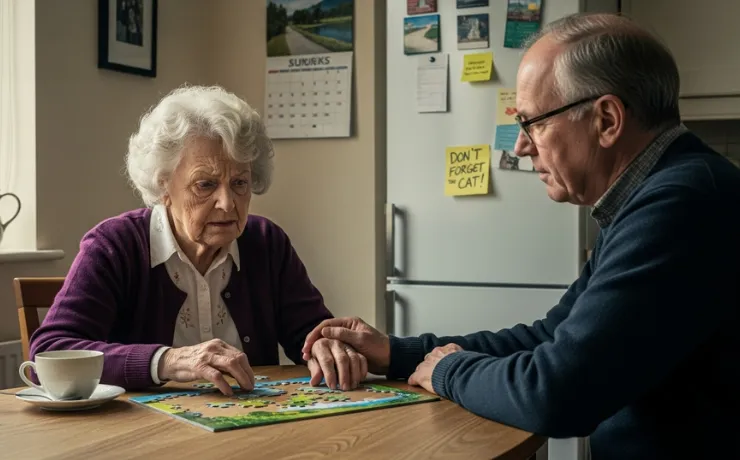Medication Support for Seniors With Memory Issues

As people age, managing medications can become more challenging — especially for seniors with memory issues such as mild cognitive impairment, dementia, or Alzheimer’s disease. Remembering which medications to take, when to take them, and in what dosage can be confusing, and even small mistakes can affect health and safety.
Pharmacists play a vital role in supporting older adults and their caregivers by helping simplify medication routines, improving safety, and providing tools that make daily management easier.
This guide explains how pharmacies help seniors with memory challenges stay on track with their medications and maintain better health.
Why Medication Management Is Important for Seniors
Many seniors take multiple prescriptions, vitamins, and over-the-counter medications each day. This is known as polypharmacy — and while each medication has a purpose, managing several at once increases the risk of:
-
Missing or double-dosing medications
-
Confusing similar-looking pills
-
Harmful drug interactions
-
Forgetting refills or running out of medication
-
Hospital visits caused by medication errors
For seniors with memory issues, these risks grow even greater. That’s why pharmacy-based medication support can make such a big difference.
Common Medication Challenges for Seniors With Memory Problems
Memory-related medication errors are often unintentional and can happen to anyone. Common issues include:
-
Forgetting doses: Missing morning or evening medications.
-
Accidentally double-dosing: Taking a medication twice in the same day.
-
Confusion about medication purpose: Not remembering what each prescription is for.
-
Difficulty reading labels: Poor eyesight or small print on bottles.
-
Managing complex schedules: Taking medications that require specific timing, such as before meals or at bedtime.
Pharmacists understand these challenges and offer practical, supportive solutions that help seniors stay safe and independent.
How Pharmacies Help Seniors Manage Their Medications
Your local pharmacy can provide multiple services to make medication management easier and safer for seniors — especially those experiencing memory issues.
1. Medication Synchronization (Med Sync)
Medication synchronization, or Med Sync, allows all prescriptions to be refilled on the same day each month.
This means seniors or caregivers only need one pharmacy trip per month, reducing confusion and stress. Pharmacists can even call or text when medications are ready, ensuring no refill is forgotten.
Pharmacist Tip: Ask your pharmacy if they offer auto-refill or delivery — perfect for seniors who have trouble remembering pickup dates.
2. Blister Packs and Compliance Packaging
Many pharmacies offer compliance packaging, also called blister packs or pill packs.
These pre-sorted packages organize medications by day and time — for example, “Monday – Morning” or “Tuesday – Evening.”
This simple visual system helps seniors and caregivers see exactly which medications should be taken and when, reducing the risk of mistakes.
Benefits:
-
Easier to track missed doses
-
No need to open multiple bottles daily
-
Portable for travel or adult day care visits
Pharmacists can update these packs each month as prescriptions change.
3. Clear Medication Instructions and Counseling
Pharmacists take the time to explain each medication in simple terms — what it’s for, how to take it, and what side effects to watch for.
For seniors with memory concerns, pharmacists can:
-
Use large-print labels for easier reading
-
Add color-coded stickers to group similar medications
-
Provide printed medication lists for easy reference
Caregivers can also request one-on-one counseling to better understand how to support their loved one’s medication routine.
4. Refill Reminders and Home Delivery
Seniors with memory problems may forget to request refills, leading to missed doses or treatment interruptions.
Pharmacies can help by:
-
Sending text, email, or phone reminders when a refill is due
-
Offering home delivery services to ensure medications arrive on time
-
Coordinating refills directly with doctors to prevent delays
These services provide peace of mind for both seniors and family caregivers.
5. Medication Reviews and Safety Checks
Pharmacists regularly review a senior’s medication list for potential duplications, side effects, or drug interactions.
This process, called a Medication Therapy Review (MTR) or Comprehensive Medication Review (CMR), helps ensure that:
-
Every medication is still needed
-
None are causing unwanted side effects
-
New prescriptions won’t conflict with existing ones
Pharmacists may also identify unnecessary or overlapping medications and work with your doctor to simplify treatment.
Pharmacist Tip: Bring all your prescription bottles, supplements, and vitamins to your pharmacy once or twice a year for a full review.
6. Simplifying Medication Schedules
Pharmacists can often coordinate with doctors to simplify medication timing, making it easier for seniors to remember their doses.
For example:
-
Combining medications to be taken at the same time of day
-
Switching to once-daily formulations
-
Recommending liquid forms if swallowing pills is difficult
Simplifying a medication routine can dramatically improve adherence and reduce stress for seniors and caregivers alike.
7. Education for Caregivers and Families
Pharmacists not only help patients but also support caregivers, who often manage medication schedules for aging parents or relatives.
They can teach caregivers how to:
-
Read prescription labels correctly
-
Store medications safely and at the right temperature
-
Use pill organizers or blister packs
-
Recognize warning signs of side effects or overdoses
This shared support network ensures the senior’s medication plan stays consistent and safe.
How Caregivers Can Support Medication Management
Caregivers play an important role in helping seniors remember and safely take their medications. Here are a few practical strategies:
-
Keep a daily medication checklist. Mark off each dose after it’s taken.
-
Use a pill organizer or blister pack. This prevents missed or double doses.
-
Set alarms or phone reminders. Technology can be a reliable backup.
-
Store medications in one visible place. Keep them out of reach of children and away from heat and moisture.
-
Involve your pharmacist. They can help adjust schedules, packaging, or delivery options as needed.
When to Talk to Your Pharmacist or Doctor
If you notice any of the following, contact your pharmacist or healthcare provider right away:
-
New confusion or worsening memory
-
Missed or extra doses
-
Unexplained dizziness, fatigue, or falls
-
Trouble swallowing or handling medications
-
Running out of medication early
Your pharmacist can evaluate whether symptoms are related to medication, dosage, or interactions — and help coordinate changes with your doctor.
The Role of Pharmacies in Senior Independence
For many seniors, maintaining independence is a top priority. With the right pharmacy support, medication management becomes easier, safer, and less stressful.
Pharmacies are more than prescription centers — they are partners in long-term care. Through personalized medication reviews, refill coordination, and accessible packaging, they help seniors live comfortably and confidently, even with memory challenges.
The Bottom Line
Seniors with memory issues deserve medication routines that are safe, simple, and reliable. Your local pharmacy provides the tools, systems, and personal support to make that possible.
From organized blister packs to automatic refills, and caregiver education, pharmacists work hard to prevent mistakes and promote independence for older adults.
If you or a loved one struggles to keep up with medications, speak with your pharmacist today. They can help design a medication support plan that fits your needs — and gives everyone peace of mind.

Need Assistance?
Need expert pharmacy advice? Request a call, and our team will assist you with prescriptions, refills, or medication questions at your convenience!
